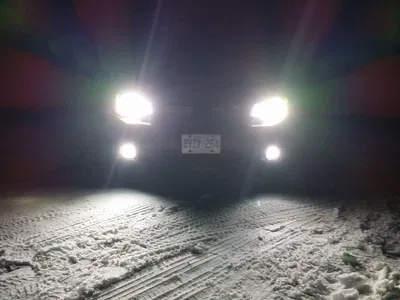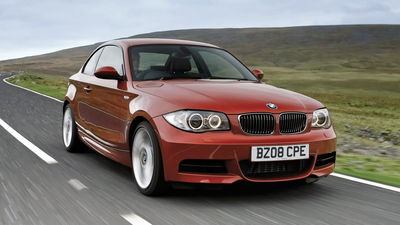LED vs Incandescent & Halogen : The Definitive Exterior Version #BlogPost
If you’ve been considering upgrading any bulbs on your own vehicle, or just like the idea of bright lights and the ability to see at night, this post is is for you. This is the culmination of roughly a year worth of upgrading dozens of different bulbs on the exterior of my daily to LED.

If you’ve been considering upgrading any bulbs on your own vehicle, or just like the idea of bright lights and the ability to see at night, this post is is for you. This is the culmination of roughly a year worth of upgrading dozens of different bulbs on the exterior of my daily to LED. This post will show stock versus the upgraded LEDs, and sometimes LEDs versus even better LEDs. I’ll also be giving costs, lumens output versus stock, and a lumens/dollar ratio. Lumens per dollar will be short formed to LPD, and any costs will be in Canadian dollars. Costs for OEM equivalent bulbs are from Walmart, whereas costs for their LED replacements are from Amazon. I’m not going to cover exact lifespans, however the longest any of the OEM bulbs can last is 10,000 hours whereas the shortest lifespan LED bulb is 30,000 hours. Lumens and wattage are listed per bulb, not per pair.
License Plate Lights

My license plate lights were the first to get upgraded on the Focus, due to necessity. I realized I had a bulb that was blown out, so it gave me a good excuse to start my conversion here. I replaced the oem incandescent bulbs with 6,500K SMD LEDs, but later upgraded to 6,000K COB LEDs.

The COB LEDs were were just as dramatic of an upgrade as my first pair of SMDs. They gave out a much whiter and cleaner beam of brighter light. The lights are now bright enough to pool on the ground at the rear of the vehicle.
OEM incandescent:
$6.37
45 lumens
5 watts
LPD: 7 lumens
SMD LED:
$3.45
72 lumens
0.72 watts
LPD: 21 lumens
COB LED:
$4.28
360 lumens
2 watts
LPD: 84 lumens
Taillights

Each taillight of my 2009 Focus has one clear bulb behind a red lens that acts as my parking lights, brake lights, and turn signals. I decided to swap the bulb for a red LED. I decided that an LED white bulb would be brighter than the red lens could tint, and would emit a pinkish light instead of red. In the end I not only wound up with a much brighter light, but it also had a much better red colour than the oem bulb afforded.
Something I really like about the LED brake lights is how fast they activate compared to incandescent. They activate 0.3 seconds quicker than my oem bulbs. That may not sound like a lot, but at highway speeds of 100 kph / 60 mph that is is a stopping difference of 26.4 feet. That can be be the difference between between a bad accident, and either a much less severe accident or none at all.
OEM incandescent:
$6.37
377 lumens
26.9 watts
LPD: 59 lumens
SMD LED:
$19.98
648 lumens
3.5 watts
LPD: 32 lumens
The LEDs may not be cheaper per lumen for this set of bulbs, but the response time and lifespan more than make up for it.
Reverse Lights

With these bulbs I tried something a little different. I still got 6,000K LEDs, but this time I ordered a set with projectors built in to really increase distance. It has worked wonders, as even with 15% tint on the rear windows I can still easily back up at night.
OEM incandescent:
$6.37
264 lumens
17.9 watts
LPD: 41 lumens
SMD LED:
$11.62
900 lumens
15 watts
LPD: 77 lumens
Parking lights

From stock, parking lights on almost every vehicle are amber and dim. They are meant to simply show up in the dark, not to actually illuminate anything. These bulbs are also what are commonly used as signals. They are also sometimes used as daytime running lights. I upgraded my oem bulbs to LED switchbacks. They are white bulbs instead of amber, except when a signal or four way hazard lights are activated. Under those circumstances, they turn amber and flash.

When on four ways, there was a similar output difference of light between the oem bulbs and my first pair of switchbacks as between my first and second pair of switchbacks. It’s also nice when the lights are white, as it is basically a supplementary set of low beam lights, with a higher lumens output than my stock low beams from my headlights. As much as I loved my first pair of switchbacks, they were too blue (7,000K) and couldn’t quite be used in lieu of low beams. The new pair are not only brighter, but are also much more white at 6,000K.
OEM incandescent:
$6.37
377 lumens
28.54 watts
LPD: 59 lumens
Old LED:
$20.98
800 lumens
3 watts
LPD: 38 lumens
New LED:
$20.98
1,050 lumens
4.5 watts
LPD: 50 lumens
Sidemarkers

Unfortunately it’s difficult to get one photo that shows both sides of a vehicle at once, so there is no comparison photo. The oem lights were so dim that even during the dark of night, I had trouble discerning whether or not they were functioning. With the LEDs, I can now see the glow over my fender while driving in the dark. The oem bulbs were also white behind an amber lens, whereas the LEDs are amber bulbs behind the same amber lens. The quality of colour is much better now, making the originals look yellow in contrast.
OEM incandescent:
$6.37
38 lumens
4.9 watts
LPD: 6 lumens
LED:
$9.78
350 lumens
1.8 watts
LPD: 36 lumens
Driving Lights

The whole point of driving lights is for them to illuminate the ground in between where your headlights hit the road and where your front bumper begins while spreading as wide as possible. LEDs are superb at wide angles, so it’s a logical next upgrade. I went from my stock halogen bulbs, to SMD LED bulbs, to COB LED bulbs. Both sets of LED bulbs were at 6,000K and looked really clean and bright. Unfortunately I don’t have a good comparison photo of SMD vs COB.
OEM halogen:
$38.37
1,100 lumens
55 watts
LPD: 28 lumens
SMD LED:
$29.99
1,200 lumens
10 watts
LPD: 40 lumens
COB LED:
$8.50
2,000 lumens
10 watts
LPD: 235 lumens
Headlights

Headlights can easily be considered one of the most important aspects of lighting on a vehicle. Without them, it’d be quite difficult to have visibility at night. My comparison photo doesn’t show oem halogens against the LEDs, but instead they are Silverstar Ultras. The Ultras are one of, if not the best halogen bulbs currently on the market. They are whiter, brighter, and have more distance and width than an oem halogen bulb.
However, even the mighty Ultras pale in every way compared to the 10,000 lumen COB LED bulbs that they were replaced with. The LEDs were cheaper, whiter, longer lasting, cooler running, immediately reach full brightness, and the beam goes farther and wider. Better yet, they work in stock headlights casing as their beam pattern is similar to halogens. No need for projectors like an HID conversion. Also, I have not had anyone high beam me at night since installing them over three months ago. It’s also worth noting that my headlight bulbs are dual filament from factory, meaning low and high beam in one bulb. These LEDs drop to half of their lumen output on low beam, which is still almost twice as bright as the factory high beams. LED headlight bulbs also last a ridiculously longer amount of time than halogens, 400× longer between my LEDs and Ultras.

Silverstar Ultra halogen:
$67.64
High beam:
•1,500 lumens
•65 watts
•75 hours lifespan
Low beam:
•1,000 lumens
•55 watts
•325 hours lifespan
LPD: 44 lumens
COB LED:
$53.99
High beam:
•5,000 lumens
•45 watts
•30,000 hours lifespan
Low beam:
•2,500 lumens
•22.5 watts
•30,000 hours lifespan
LPD: 185 lumens
Full conversion completed

Final comparison accounting for all exterior bulbs is as follows.
OEM:
$137.86
7,402 lumens
203.24 watts
LPD: 53 lumens
LED:
$129.13
20,616 lumens
81.8 watts
LPD: 159 lumens
As is readily apparent, the LEDs are far superior in everyway. Whether it is colour quality, lifespan, speed of lighting, efficiency, lumens output, cost, or value; LEDs are worth the switch. The LEDs cost a tad less to replace all of the exterior bulbs, while tripling light output and the value of lumens per dollar. Better yet, the LEDs only take up 40% of the electricity that the incandescents and halogens formerly used. That makes these LEDs seven times more efficient per watt than the OEM bulbs.
Below is a walk around of the Focus at night, showing the various lights and their functions.













Comments
Nice post
Thanks! Took a while to make. LoL
Emite45
StuStuStuwart (WagonSquad)
Jonathan
Mark Mason
Kian Duesing (2 Nation Car Guy)
ThatElementGuy (Element Squad)
Great read, where do you buy your lights?
Andrew Whiteman
Thank you for the detailed write-up! I see you ended up with COBs for most everything. I am interested in those, but I have also found so-called plasma leds. Debating between what to get. Cost is important, I have 6 taillights to do :)
Joni Sjöholm
Very good blogpost! I didn’t know much at all about car lights, But now i know that when in about 4months im getting my first car i’ll upgrade to leds instantly.
William
Pagination